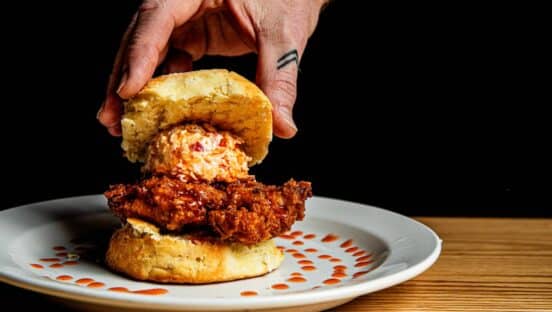Amy’s Drive Thru isn’t just any fast-food joint. Behind its offerings of burgers, pizzas, burritos, and mac and cheese lies a true investment in the ethos that vegetarian, organic, and sustainable food will lead the restaurant industry forward.
That’s why Amy’s Drive Thru committed to net zero, which requires sustainability practices to balance the amount of greenhouse gas produced and the amount removed from the atmosphere. The fourth, and latest, location in Roseville, California, and all others to come, will be being designed with this goal in mind.
The California-based chain is directed by the Berliner family—the same family that founded Amy’s Kitchen and pioneered an organic and vegetarian food movement in the 1980s.
By the 2000s, friends of the family began to ask, why don’t they create a restaurant that brings the same organic, vegetarian, and sustainable approach they mastered in frozen foods to a restaurant environment? In 2015, Amy’s Drive Thru was born.
The brand was a natural extension of Amy’s Kitchen. The Berliners envisioned Amy’s Drive Thru would increase accessibility of organic, vegetarian food to more people at an affordable price point. In short, the Berliners wanted to redefine the classic American drive-thru.
Now, Amy’s Drive Thru has plans to open 17 new locations across the West Coast including in areas like Los Angeles, Sacramento, Portland, and Seattle.
Sustainability plays into everything Amy’s Drive Thru does, brand president Dave Wolfgram says. Growing organic produce has a more positive impact on the environment compared to conventionally raising foods due to reducing pollution, conserving water, and using less energy.
“We’ve been focusing on that since the birth of Amy’s Drive Thru,” Wolfgram says. “We’re constantly looking to improve it. From the start, it was very important to our founders that the business we were growing has a beneficial impact on the planet. So the more restaurants we open, the more veggie burgers we serve, the more animal-based products that those veggie burgers can replace, the greater impact on the planet.”
All of Amy’s Drive Thru packaging is compostable, right down to the organic cotton T-shirt uniforms. The chain uses solar energy to offset its electricity, recycles water whenever possible, and taps natural renewable materials during construction of buildings.
Amy’s Drive Thru was fortunate this past year. The business model was always a drive-thru, so customers and employees could continue operating safely amid pandemic conditions. The San Francisco International Airport Amy’s Drive Thru was the only location that had to temporarily close. Amy’s Drive Thru even opened one new location in Corte Madera, California, last August.
“I think people are looking to companies to help lead the way,” Wolfgram says. “We want to be part of that thought leadership on sustainability.
The pandemic, however, did challenge Amy’s Drive Thru. It pushed the brand to become better, Wolfgram says. Now Amy’s Drive Thru is more efficient, having introduced curbside, mobile ordering, and delivery. At first, sales dipped like other restaurants, but sales are now positive over the 2019 year.
Many restaurants found themselves in a less-than-ideal situation as fewer people sought work in restaurants, in part caused by expanded unemployment benefits and fear of contracting coronavirus at work.
Hiring employees has definitely been more challenging than in the past, Wolfgram admits. But leaning into the company’s values of organic food and sustainability has attracted talent with similar values.
“There’s a lot of young people that are very passionate about what we’re passionate about,” Wolfgram says. “So we’ve been able to attract people that are passionate, and we’ve had very little turnover because we have people that are committed to the same values that we have.”
The global pandemic also sparked consumers to think deeper about their own health and the planet, Wolfgram says, adding an increasing number of people are focused on eating plant-based foods. They don’t have to be full vegetarians; the flexitarian label has seen an increase in popularity.
It’s not just the pandemic influencing consumer behavior, either. The impending fallout from climate change also inspired guests, especially young generations that put stock into supporting companies that are more thoughtful when it comes to sustainability and their impact on the planet, Wolfgram says.
“I think people are looking to companies to help lead the way,” Wolfgram says. “We want to be part of that thought leadership on sustainability. We want to make a difference in the food service sector.”
By bringing organic foods into the fast-food arena, Wolfgram says, Amy’s Drive Thru is making a once-inaccessible category work for more people. No matter if customers are gluten or dairy-free, Amy’s Drive Thru has options: gluten-free buns and patties and dairy-free milkshakes made from coconut or almond milk.
“If we can move people from conventional farming to organic farming and animal-based products to plant-based products, the impact on the planet is incredible,” Wolfgram says.
Amy’s Drive Thru’s mission is nowhere near complete, though. Working with its architect
and engineering teams, Wolfgram says the brand is constantly looking for ways to improve its impact on the planet. The latest goal is just one move in that direction.
“That’s what we’re striving for,” Wolfgram said. “We’re not there yet, but we’re always striving to get to net zero.”




